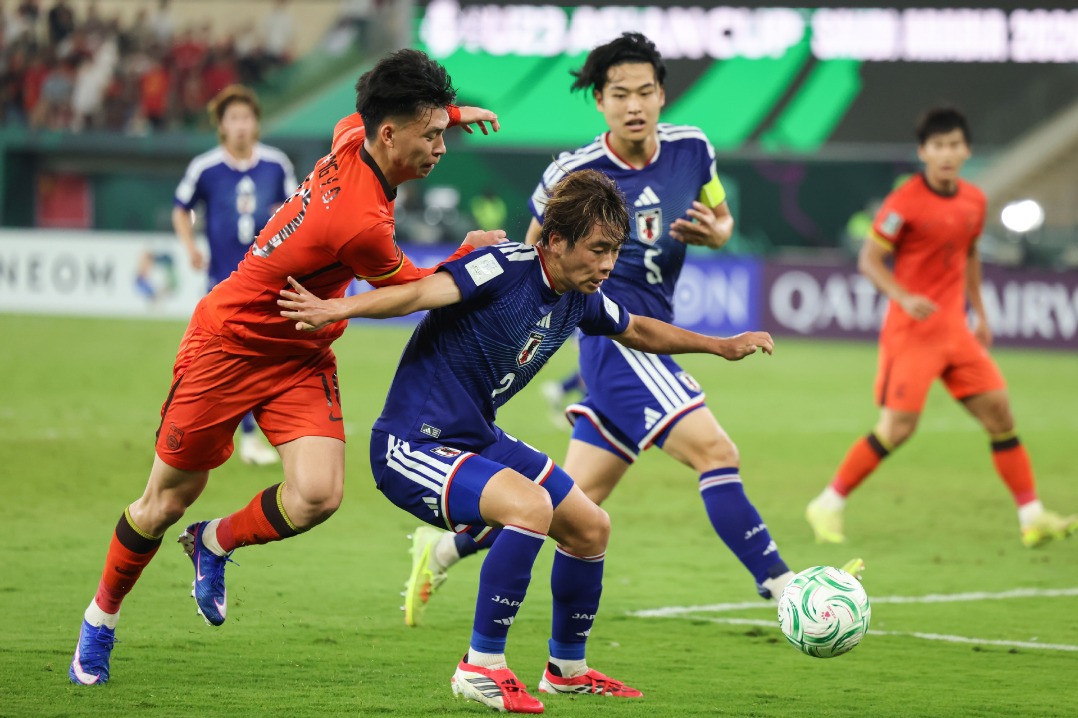Chinese game teeing up bright future, says veteran Cheng

After teaming up with the next generation of golfers at last week's Sina Cup in Beijing, veteran Cheng Jun is confident that China has a bright future on the tees and greens.
The two-day Ryder Cup-style event at Beijing Shadow Creek Golf Club pitted the Cheng-captained Blue Team, comprised of six male professionals and six female amateurs, against the Red Team, led by Ye Liying and comprised of six female pros and six male amateurs.
Cheng's Blues prevailed 11-9, but the 52-year-old Beijinger reckoned the real winner was the domestic golf scene.
"Many of the young players are just about 20 years old. So in such a match-play format, the professionals and amateurs are really collaborating on the course, which is really important for the sport's growth in China," said Cheng, a winner of the 1997 Volvo China Open.
"Being part of the first wave of Chinese golfers, I witnessed golf's growth in our country over the past 37 years. Our players are making good progress thanks to the support of many people.
"Even this week at this course, I noticed many more parents are taking their children to play golf. And this event also offers them the opportunity to interact with professional golfers, which I think will have a very positive influence on their development.
"I talked with some of the kids at the club, many are just 7 or 8 years old. If they can keep playing and training, I believe some of them, after maybe 10 years, can also participate in events like the Sina Cup.
"I recalled some stories and experiences from my career to them this week. These stories can encourage them. So, generation after generation, I believe in a brighter future for Chinese golf."
Former women's world No 1 Feng Shanshan was a captain at last year's Sina Cup. She will this week go for gold at the Tokyo Olympics, serving as a fine role model for the young talent coming through the ranks and illustrating the value of events like the Sina Cup.
"In recent years, Chinese golf has experienced rapid development. At the 2016 Rio Olympics, Feng Shanshan won a bronze medal for China, and she stayed at the top of the world rankings for a very long time, which is very hard for a Chinese player to do," said Cheng.
"Right now, Feng is once again participating in the Olympics in Tokyo along with Lin Xiyu. On the men's side, we have Carl Yuan Yechun and Wu Ashun, who is a three-time European Tour winner.
"This year, I had the chance to play in the Sina Cup, which is a great way for me and the young players to communicate. And through the event, we can introduce more people to the sport and the current state of Chinese golf."
Last week's Sina Cup featured six youngsters who are chasing their golf dreams in the National Collegiate Athletic Association in the US, such as Stanford University junior Ye Lei who debuted on the NCAA earlier this year.
"Because of the pandemic, this has been a very special NCAA season. To minimize interaction with the outside world, we live and train together with the team. But the season schedule is very busy. From March to May, we played more matches than usual," said the 20-year-old.
"We had less time to stay in school, but still we needed to have online classes. We needed to coordinate our study time with competing. So, it's a busy student-athlete life.
"Now that the season is over, I feel I'm more independent than before. I need to manage my own time and I need to adjust to the golf course much quicker than before. The pace in the NCAA is a lot faster than domestic events."
Such experiences would have been almost unthinkable for Cheng's generation of Chinese golfers, and he admits the new breed already appear to be benefiting from the elite environment.
"I've been hugely impressed by many of the young players at the event. Despite their age, they are outstanding in terms of skills and overall temperament," said Cheng.
"In particular, we have some players who are studying and playing in top universities in the US, including Stanford and Yale. Their experiences are very impressive.
"Although the number of golf clubs in China is still relatively low, we can see the next generation's passion toward golf is growing.
"I'm not saying all golf-loving kids will become professional players, but through the sport they can develop as people and acquire a lot more qualities.
"And they can also gain admission to the world's top universities through golf."
Li Hong, managing director of the China LPGA Tour, which co-organized the Sina Cup, concurred with Cheng that golf's benefits go way beyond the action on the fairways.
"Playing golf offers parents and their kids more options in education and down the line with their careers. Many universities acknowledge the performance of Chinese students who play the game," said Li.
"So in the NCAA, young Chinese players can combine quality golf training with academic studies at the same time.
"This is a really well-rounded development model for them."

Today's Top News
- 17 rescued Filipino crew members transferred
- Finnish PM arrives in Beijing for official visit
- Beijing leads Chinese cities in number of registered AI models
- WHO chief says US reasons for withdrawal 'untrue'
- Xi congratulates Yoweri Museveni on re-election as president of Uganda
- Senior military officials under investigation






























